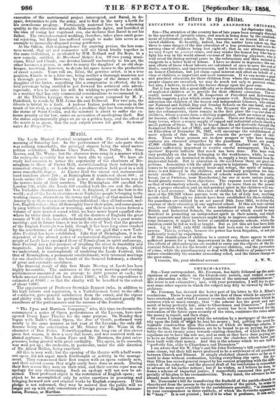Itittrs to the tbiter.
EDUCATION OF PAUPER AND ABANDONED CHTEDREN, 1st September 1868.
Sra—The attention of the country has of late years been strongly directed to the question of juvenile crime, and much is being done by the establiale ment of reformatory schools, for the restoration to an honest life of eon.. victed children. So heartily, indeed, has the matter been taken up, that there is some danger of the due education of a less prominent but more de- serving class of children being lost sight of; that in our attempts to ane we may forget to prevent crime, and may render the honest boy who has to fight his way in the world almost envious of his thriving playmate, who hi well cared for during several years in the reformatory and then assisted to emigrate to a better field of labour. I have no desire to depreciate the eat_ nest efforts of those whose labours are calculated at once to save the con of thefts, convictions, and imprisonments, and to turn the criminal youth into an honest Christian, but yet claim equal interest and effort on behalf of class of children as important and more numerous. If we can secure a good and practical education for those children from whom the criminal anrrthe pauper classes are recruited, we may do much not only to prevent crime, but also, I believe, to reduce the future charge upon the poor-rate. But it has been felt a great difficulty so to distinguish these various classes of neglected children as to provide for their efficient education. The re. cently issued reports of H. M. Inspectors of Parochial and Reform/deny Schools suggests a plan which seems to promise well. Excluding from con- sideration the children of the honest and independent labourer, who attend our National and British Day and Sunday Schools on the one hand, and on the other the actually criminal class, who frequent the prisons, and pays into the reformatories' there remain in the first place the vagrant class of children, Whose parents form a shifting poaulatiote with no source of regu- lar income, either from labour or the parish. • These are found chiefly in our large towns, where a scanty supply of ragged and industrial schools absorb a small portion of them. It is to be hoped that the aid derivable through the Industrial Schools' Act of 1857, and the minute of the Committee of Council on Education of December 31, 1857, will encourage the establishment of more schools of this class. There remain the pauper class of chil- dren. Those whose parents are in-door paupers or who have become orphans are educated altogether by the guardians. There are nearly 47,000 children in the workhouse schools of England and Wales, a number sufficiently important to receive careful management. The In- spectors' Reports indicate that much has been done. The boys work very profitably on the land belonging to the workhouses, while, in some instances, they are instructed in music, to supply a large demand from the regimental bands. But to education in the workhouse there are great ob- jections. Association with the adult paupers is injurious. The workhouse comes to be regarded as a natural home and refuge, the spirit of indepen- dence is not fostered in the children, and hereditary pauperism too com- monly results. The establishment of schools separate from the union house, (as at Swinton, near Manchester,) for one or more unions jointly, would greatly remove these objections. The expense need not be so greet as that of reformatory schools, and even if it be more than on the present plan, a proper education and an independent spirit in the children will ren- der it a real economy. But this class of children fall far short in import- ance of the 259,953 whose parents were on the let of July last, remixing parish relief. Though no schools have been established for these children, the guardians are enabled by an act passed 26th June 1865, to defray the expense of their education in any approved school. If this act were carried out, these children would be at once introduced into our National and British and Industrial Schools, the associations of which would be very beneficial in promoting an independent spirit in their minds, and which their payments and their numbers might help to improve considerably. In some instances, it might be better to establish separate schools, where the children could be fed as well as taught. But as yet this act has been little used. Up to 1857, only 6537 children had been sent to school under its powers. This is, perhaps, because the power has been forgotten, or not yet sufficiently tested by experience. If this classification of children be a correct one, there appear to exist sufficient powers for- a vast improvement in the education of, the country. The efforts of philanthropists are needed to tarry out the objects of the In- dustrial Schools Act for the benefit of vagrant children, anti the prevention of crime, while the guardians may so deal with the children of paupers as to reduce considerably the number demanding relief, and the future charge en the poor-rates.
I remain, Sir, your obedient servant. A. W. W.


























 Previous page
Previous page